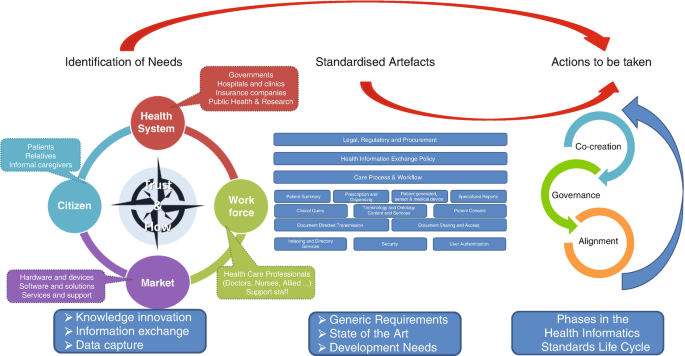Modern healthcare is evolving at an unprecedented pace, driven by advancements in technology, data analytics, and patient-centric care. Central to this transformation is the standardization of health data.
The seamless exchange of healthcare information is vital for enhancing patient care, reducing costs, and supporting research and public health initiatives. In this blog, we’ll look at the significance of health data standards, how they affect healthcare, and the numbers that back them up.
Understanding Health Data Standards
Health data standards are sets of laws and regulations that specify how medical data is gathered, handled, and disseminated.

Regardless of the systems or applications involved, they make sure that data is consistently formatted, facilitating its exchange and interpretation. These standards are crucial for various aspects of modern healthcare, from electronic health records (EHRs) to interoperability and research. Some of the key health data standards include:
1. HL7 (Health Level Seven): HL7 is a widely adopted standard for electronic data exchange in healthcare. It defines protocols for clinical and administrative data exchange and is used in EHR systems and health information exchanges.
2. DICOM (Digital Imaging and Communications in Medicine): DICOM is focused on medical imaging data, ensuring compatibility between various imaging devices and systems.
3. SNOMED CT: A standardized medical terminology used for encoding clinical information, facilitating the exchange of structured clinical data.
4. ICD-10 (International Classification of Diseases, 10th Edition): This standard is crucial for coding diseases, conditions, and procedures, allowing for uniform billing and research in healthcare.
5. CDA (Clinical Document Architecture): CDA is a standard for creating structured clinical documents, such as discharge summaries, progress notes, and diagnostic reports.
The Impact of Health Data Standards
Interoperability: One of the most significant benefits of health data standards is interoperability. Health systems, providers, and researchers can seamlessly exchange data, regardless of the software or hardware they use. A survey by the Office of the National Coordinator for Health Information Technology (ONC) found that in 2019, 91% of hospitals had adopted certified EHR technology, enabling data sharing. (Source: ONC Data Brief)
Improved Patient Care: Health data standards facilitate a more comprehensive view of the patient’s medical history. This enables healthcare providers to make informed decisions, reduces medical errors, and enhances patient safety. The Healthcare Information and Management Systems Society (HIMSS) found that 82% of surveyed hospitals reported improved patient care because of EHR use. (Source: HIMSS Analytics)
Public Health and Research: Standardized data plays a pivotal role in public health initiatives and medical research. During the COVID-19 pandemic, data standardization was essential for tracking and controlling the spread of the virus. The Centers for Disease Control and Prevention (CDC) relied on interoperable systems to report cases, facilitating a swift response.
Cost Savings: Health data standards contribute to cost reduction in healthcare. A report by the Journal of the American Medical Informatics Association estimated that using standardized patient IDs could save the U.S. healthcare system up to $1.2 billion annually.
Research and Clinical Trials: The utilization of standardized data is essential in clinical research and trials. It allows researchers to analyze data efficiently and compare results across different studies. A study published in the Journal of General Internal Medicine found that clinical data standards significantly improve data quality in clinical trials.
Challenges in Implementing Health Data Standards
While health data standards offer numerous advantages, their implementation isn’t without challenges. Some of the common obstacles include:
- Fragmented Systems: Many healthcare organizations still use legacy systems that do not conform to modern data standards. This makes it difficult to achieve universal interoperability.
- Privacy and Security: Ensuring the confidentiality and security of standardized health data is a constant concern. Data breaches can have severe consequences for patients and healthcare providers.
- Standard Evolution: Health data standards continually evolve to accommodate new technologies and medical practices. Staying up-to-date with these changes can be resource-intensive.
- Resistance to Change: Some healthcare professionals may be resistant to adopting new technologies and data standards, which can hinder progress.
Conclusion
Health data standards play a crucial role in modern healthcare, offering benefits that extend from improved patient care to cost savings and research advancements. The ability to exchange information seamlessly and securely is fundamental to the healthcare ecosystem. While challenges exist, the continued development and adoption of health data standards are essential for the future of healthcare.
Healthcare professionals, researchers, and policymakers can fully utilize contemporary technology and data-driven decision-making by following standardized data practices, which will eventually improve health outcomes for individuals and communities.
We are establishing a healthcare system that is more integrated, effective, and responsive to the demands of patients and society at large through the implementation and adaptation of health data standards. Staying informed and adhering to these standards will be essential to ensure that healthcare keeps improving as we move forward.








